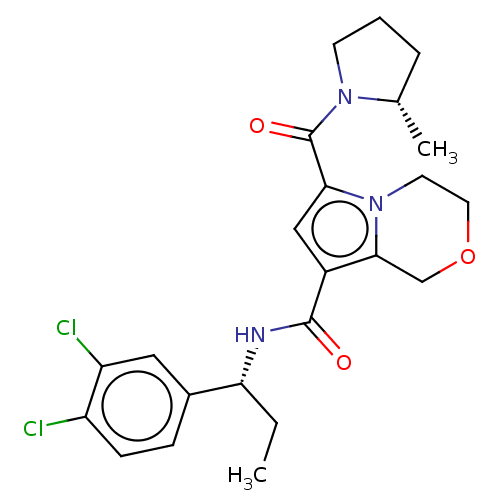

 Search and Browse
Search and Browse
 Download
Download
 Enter Data
Enter Data
null
SMILES: CC[C@@H](NC(=O)c1cc(C(=O)N2CCC[C@@H]2C)n2CCOCc12)c1ccc(Cl)c(Cl)c1
InChI Key: InChIKey=DWMYZHDZTBDFJZ-IFXJQAMLSA-N
| Target/Host (Institution) | Ligand | Target/Host Links | Ligand Links | Trg + Lig Links | Ki nM | ΔG° kcal/mole | IC50 nM | Kd nM | EC50/IC50 nM | koff s-1 | kon M-1s-1 | pH | Temp °C |
|---|---|---|---|---|---|---|---|---|---|---|---|---|---|
| Potassium voltage-gated channel subfamily H member 2 (Homo sapiens (Human)) | BDBM218343 (US9284333, 16ci | US9884860, Example 16ci) | PDB MMDB Reactome pathway KEGG UniProtKB/SwissProt B.MOAD DrugBank antibodypedia GoogleScholar AffyNet | PC cid PC sid UniChem | US Patent | n/a | n/a | 1.00E+4 | n/a | n/a | n/a | n/a | n/a | 25 |
Sanofi US Patent | Assay Description The effect of compounds of the formula I on the cloned human cardiac hERG channel was evaluated in an in vitro model using a whole-cell patch-clampin... | US Patent US9284333 (2016) BindingDB Entry DOI: 10.7270/Q2FJ2FMC | |||||||||||
| More data for this Ligand-Target Pair | |||||||||||||
| Potassium channel subfamily K member 3 (Homo sapiens (Human)) | BDBM218343 (US9284333, 16ci | US9884860, Example 16ci) | PDB KEGG UniProtKB/SwissProt DrugBank antibodypedia GoogleScholar AffyNet | PC cid PC sid UniChem | US Patent | n/a | n/a | 30 | n/a | n/a | n/a | n/a | n/a | 25 |
Sanofi US Patent | Assay Description Human TASK-1 channels were expressed in Xenopus oocytes. For this purpose, oocytes were isolated from Xenopus laevis and defoliculated. Subsequently,... | US Patent US9884860 (2018) BindingDB Entry DOI: 10.7270/Q2862JGT | |||||||||||
| More data for this Ligand-Target Pair | |||||||||||||
| Potassium channel subfamily K member 3 (Homo sapiens (Human)) | BDBM218343 (US9284333, 16ci | US9884860, Example 16ci) | PDB KEGG UniProtKB/SwissProt DrugBank antibodypedia GoogleScholar AffyNet | PC cid PC sid UniChem | US Patent | n/a | n/a | 30 | n/a | n/a | n/a | n/a | n/a | 25 |
Sanofi US Patent | Assay Description Human TASK-1 channels were expressed in Xenopus oocytes. For this purpose, oocytes were isolated from Xenopus laevis and defoliculated. Subsequently,... | US Patent US9284333 (2016) BindingDB Entry DOI: 10.7270/Q2FJ2FMC | |||||||||||
| More data for this Ligand-Target Pair | |||||||||||||